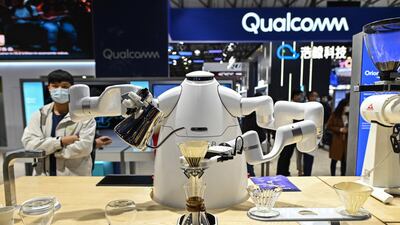Over the next few months, we will feel the impact of the technology behind Generative AI across a wide range of sectors such as pharmaceutical research and development, transport, energy, waste reduction and cancer treatment. The outcomes and accomplishments will change the way we live and work.
Its promise is that we will live longer, and our well-being and quality of life will dramatically improve. But how likely is this to play out for working professionals? One theory is that it will result in mass unemployment. Could that be our reality along with the social, political and economic turmoil that would surely follow in its wake?
Let’s look back at the first two years of a world with Generative AI. Many of us are more frequently turning to applications such as ChatGPT or Gemini or Midjourney or Runway to help produce stronger writing, research, designs and images more quickly.
Since the advent of this technology, there has been a gradual increase in job cuts, especially by the largest tech companies but not confined to that sector. In the US and Europe, the biggest companies such as Meta, Microsoft, Google, Apple and IBM have shed staff.
This has largely affected office jobs. But beyond IT companies, head counts have been reduced by corporations in a broad range of sectors including finance, automobiles and heavy industry.
There are ethical questions to be debated and discussed. What limits should there be on AI? And who should be setting the guardrails
Some of this is related to the Covid-19 pandemic and over-hiring once the economic crisis subsided. But now, as we approach a new year, months of higher inflation are beginning to bite and profit margins are being protected.
The data points related to overall proportion of jobs being lost because of AI are only in the low double-digits. This rate will rise, as will the number of never-seen-before roles that AI brings to the market. New jobs have been limited to, for example, prompt engineers.
So far, the conclusion must be that the promise of Generative AI has been low key – as have the consequences. But when the impact accelerates, we have to assume that the fallout will be bigger.
Up to now, the most common responses to this new era have been to choose a belief or ignore it. We have the optimists who focus on the enhancement we will gain, and there are the pessimists who worry not only about livelihoods but where this power will take us.
There are ethical questions to be debated and discussed. What limits should there be on AI? And who should be setting the guardrails: governments, companies, consumers, or all of the above?
The next two years will probably be extremely volatile, with greater uncertainty and a faster pace of progress. We often look to the bigger picture for how we should confront such times. We also take our cues from experts and leaders. However, we might be better off in the long run by focusing on the personal.
We all have our moral judgment, which we rely on daily for decision-making. We should apply it to AI.
For example, when you receive an email written with the help of Generative AI, are you OK with that? Does it show you how technology can enhance our communication, make us all better, more efficient and stronger? Or do you regard it as cheating, allowing someone who doesn’t have a skill to fake it? There is no one answer.
Just like technology, our morality evolves as we discover new things.
Unlike weighing the pros and cons of using AI for our writing, it is quite hard to make a case against using AI to help cure cancer or use robotics to perform complex operations with a higher chance of success. This is especially if it might mean saving a loved one.
Ultimately, that is what our world is. It is a product of how we interact with the people around us. We want those we care about to live better lives. We want it for ourselves.
Should we want it for those we don’t know? We say we do, but it is difficult to put that intent into practice on a global level as individuals. How do we feel about a stranger losing their job to a machine? Is that a world we are OK with? What conditions would we need for that to be acceptable to you?
Do we know someone who has actually lost their job because of the advent of Generative AI? If we do, that might frame your thinking about the technology, and we may want to exact a much more stringent framework for its use. But if we don’t, then any anxiety about it might be centred on the risk of the same thing happening to us.
Is this not as abstract a fear as the thought of killer robots running amok? Sure, we have been told that it could happen, but we haven’t actually seen evidence of it ourselves. If we aren’t worried about losing our job, then why is that? Should it be down to denial, then the time has come to break out of it.
We should think about the potential costs and benefits of AI becoming ubiquitous. How might that remake our lives? It is useful to remember the lesson of smartphones here. In that context, we cannot deny that there should have been guardrails in place early.
We should not make that same mistake again. In other words, we shouldn’t make the mistake of thinking that we shouldn’t be helping to decide in what direction the new technologies should go.
Mercer, the investment consulting arm of US services company Marsh & McLennan, expects its wealth division to at least double its assets under management (AUM) in the Middle East as wealth in the region continues to grow despite economic headwinds, a company official said.
Mercer Wealth, which globally has $160 billion in AUM, plans to boost its AUM in the region to $2-$3bn in the next 2-3 years from the present $1bn, said Yasir AbuShaban, a Dubai-based principal with Mercer Wealth.
“Within the next two to three years, we are looking at reaching $2 to $3 billion as a conservative estimate and we do see an opportunity to do so,” said Mr AbuShaban.
Mercer does not directly make investments, but allocates clients’ money they have discretion to, to professional asset managers. They also provide advice to clients.
“We have buying power. We can negotiate on their (client’s) behalf with asset managers to provide them lower fees than they otherwise would have to get on their own,” he added.
Mercer Wealth’s clients include sovereign wealth funds, family offices, and insurance companies among others.
From its office in Dubai, Mercer also looks after Africa, India and Turkey, where they also see opportunity for growth.
Wealth creation in Middle East and Africa (MEA) grew 8.5 per cent to $8.1 trillion last year from $7.5tn in 2015, higher than last year’s global average of 6 per cent and the second-highest growth in a region after Asia-Pacific which grew 9.9 per cent, according to consultancy Boston Consulting Group (BCG). In the region, where wealth grew just 1.9 per cent in 2015 compared with 2014, a pickup in oil prices has helped in wealth generation.
BCG is forecasting MEA wealth will rise to $12tn by 2021, growing at an annual average of 8 per cent.
Drivers of wealth generation in the region will be split evenly between new wealth creation and growth of performance of existing assets, according to BCG.
Another general trend in the region is clients’ looking for a comprehensive approach to investing, according to Mr AbuShaban.
“Institutional investors or some of the families are seeing a slowdown in the available capital they have to invest and in that sense they are looking at optimizing the way they manage their portfolios and making sure they are not investing haphazardly and different parts of their investment are working together,” said Mr AbuShaban.
Some clients also have a higher appetite for risk, given the low interest-rate environment that does not provide enough yield for some institutional investors. These clients are keen to invest in illiquid assets, such as private equity and infrastructure.
“What we have seen is a desire for higher returns in what has been a low-return environment specifically in various fixed income or bonds,” he said.
“In this environment, we have seen a de facto increase in the risk that clients are taking in things like illiquid investments, private equity investments, infrastructure and private debt, those kind of investments were higher illiquidity results in incrementally higher returns.”
The Abu Dhabi Investment Authority, one of the largest sovereign wealth funds, said in its 2016 report that has gradually increased its exposure in direct private equity and private credit transactions, mainly in Asian markets and especially in China and India. The authority’s private equity department focused on structured equities owing to “their defensive characteristics.”
In-demand jobs and monthly salaries
- Technology expert in robotics and automation: Dh20,000 to Dh40,000
- Energy engineer: Dh25,000 to Dh30,000
- Production engineer: Dh30,000 to Dh40,000
- Data-driven supply chain management professional: Dh30,000 to Dh50,000
- HR leader: Dh40,000 to Dh60,000
- Engineering leader: Dh30,000 to Dh55,000
- Project manager: Dh55,000 to Dh65,000
- Senior reservoir engineer: Dh40,000 to Dh55,000
- Senior drilling engineer: Dh38,000 to Dh46,000
- Senior process engineer: Dh28,000 to Dh38,000
- Senior maintenance engineer: Dh22,000 to Dh34,000
- Field engineer: Dh6,500 to Dh7,500
- Field supervisor: Dh9,000 to Dh12,000
- Field operator: Dh5,000 to Dh7,000
The specs
Engine: 4.0-litre, six-cylinder
Transmission: six-speed manual
Power: 395bhp
Torque: 420Nm
Price: from Dh321,200
On sale: now
Dengue%20fever%20symptoms
%3Cp%3EHigh%20fever%20(40%C2%B0C%2F104%C2%B0F)%3Cbr%3ESevere%20headache%3Cbr%3EPain%20behind%20the%20eyes%3Cbr%3EMuscle%20and%20joint%20pains%3Cbr%3ENausea%3Cbr%3EVomiting%3Cbr%3ESwollen%20glands%3Cbr%3ERash%26nbsp%3B%3C%2Fp%3E%0A
COMPANY%20PROFILE
%3Cp%3E%3Cstrong%3EName%3A%20%3C%2Fstrong%3EKinetic%207%3Cbr%3E%3Cstrong%3EStarted%3A%3C%2Fstrong%3E%202018%3Cbr%3E%3Cstrong%3EFounder%3A%3C%2Fstrong%3E%20Rick%20Parish%3Cbr%3E%3Cstrong%3EBased%3A%3C%2Fstrong%3E%20Abu%20Dhabi%2C%20UAE%3Cbr%3E%3Cstrong%3EIndustry%3A%3C%2Fstrong%3E%20Clean%20cooking%3Cbr%3E%3Cstrong%3EFunding%3A%3C%2Fstrong%3E%20%2410%20million%3Cbr%3E%3Cstrong%3EInvestors%3A%3C%2Fstrong%3E%20Self-funded%3C%2Fp%3E%0A
Specs
Engine: 51.5kW electric motor
Range: 400km
Power: 134bhp
Torque: 175Nm
Price: From Dh98,800
Available: Now
UK’s AI plan
- AI ambassadors such as MIT economist Simon Johnson, Monzo cofounder Tom Blomfield and Google DeepMind’s Raia Hadsell
- £10bn AI growth zone in South Wales to create 5,000 jobs
- £100m of government support for startups building AI hardware products
- £250m to train new AI models
Safety 'top priority' for rival hyperloop company
The chief operating officer of Hyperloop Transportation Technologies, Andres de Leon, said his company's hyperloop technology is “ready” and safe.
He said the company prioritised safety throughout its development and, last year, Munich Re, one of the world's largest reinsurance companies, announced it was ready to insure their technology.
“Our levitation, propulsion, and vacuum technology have all been developed [...] over several decades and have been deployed and tested at full scale,” he said in a statement to The National.
“Only once the system has been certified and approved will it move people,” he said.
HyperloopTT has begun designing and engineering processes for its Abu Dhabi projects and hopes to break ground soon.
With no delivery date yet announced, Mr de Leon said timelines had to be considered carefully, as government approval, permits, and regulations could create necessary delays.
WRESTLING HIGHLIGHTS
COMPANY PROFILE
Name: HyperSpace
Started: 2020
Founders: Alexander Heller, Rama Allen and Desi Gonzalez
Based: Dubai, UAE
Sector: Entertainment
Number of staff: 210
Investment raised: $75 million from investors including Galaxy Interactive, Riyadh Season, Sega Ventures and Apis Venture Partners
FULL%20FIGHT%20CARD
%3Cp%3EFeatherweight%20Bout%3A%0D%20Abdullah%20Al%20Qahtani%20v%20Taha%20Bendaoud%0D%3Cbr%3EBantamweight%20Bout%3A%0D%20Ali%20Taleb%20v%20Nawras%20Abzakh%0D%3Cbr%3EBantamweight%20Bout%3A%0D%20Xavier%20Alaoui%20v%20Rachid%20El%20Hazoume%0D%3Cbr%3EFeatherweight%20Bout%3A%0D%20Islam%20Reda%20v%20Adam%20Meskini%0D%3Cbr%3EBantamweight%20Bout%3A%0D%20Tariq%20Ismail%20v%20Jalal%20Al%20Daaja%0D%3Cbr%3EBantamweight%20Bout%3A%0D%20Elias%20Boudegzdame%20v%20Hassan%20Mandour%0D%3Cbr%3EAmateur%20Female%20Atomweight%20Bout%3A%0D%20Hattan%20Al%20Saif%20v%20Nada%20Faheem%0D%3Cbr%3EFeatherweight%20Bout%3A%0D%20Maraoune%20Bellagouit%20v%20Motaz%20Askar%0D%3Cbr%3EFeatherweight%20Bout%3A%0D%20Ahmed%20Tarek%20v%20Abdelrahman%20Alhyasat%0D%3Cbr%3EShowcase%20Featherweight%20Bout%3A%0D%20Mido%20Mohamed%20v%20Yazeed%20Hasanain%0D%3Cbr%3EShowcase%20Flyweight%20Bout%3A%0D%20Malik%20Basahel%20v%20Harsh%20Pandya%0D%3C%2Fp%3E%0A



